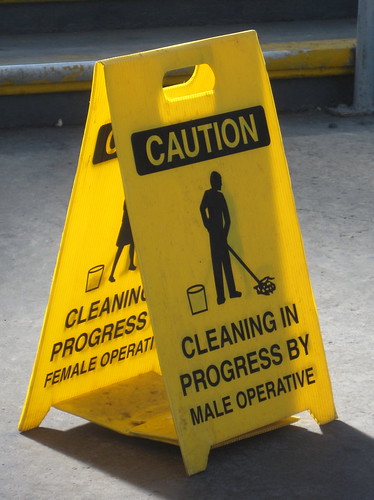This morning I read Kelly Jensen’s most excellent BookRiot piece which included an interesting link to a publisher site describing “clean YA,” where “clean” is not meant to stand in opposition to unclean, but describes a kind of doughty, go-get-’em kind of hero or heroine who never says die.
Kelly’s piece goes on to debunk that idea and talk about the virtues of quitting, but I, predictably, got stuck on the word “clean.” As “Words have meaning,” as my dear friend and fellow English teacher Susan Goins used to constantly tell her junior high students, the company saying that clean “certainly isn’t meant to be the opposite of ‘dirty,’” seems inherently problematic. Use of the word clean implies that books, or reading, can be categorized into good/bad by some vagaries of categorization, that virtue can be tied to some reading choices, and shame applied to others… This is a familiar song, but a troubling one.
See, I grew up believing this – or at least with this idea of virtuous cleanliness floating through the ether, based on the scripture about “set your minds on these things” – which specified things true, pure, right, lovely, etc. Fiction didn’t come into that list. Fiction wasn’t openly allowable as reading at my house, and reading wasn’t truly encouraged unless it was a.) approved post-church-you-have-nothing-else-you-should-be-doing reading, or reading, b.) in association with homework or c.) reading awarded as a sneaky indulgence after many chores had been done, and there wasn’t anything someone could think up to discourage me, and I was hiding behind a couch or on the roof of the shed in the backyard. Yes, I smuggled reading time like some kids smuggle… whatever contraband. I was restricted from the things which I could check out from the library, because my parents were the deciders on what was appropriate. It was like being seated at the immense smorgasbord of the world, and being told I could have my choice of half of all the dishes without salt. Unfortunately, that went on well into high school, where I should have been trusted to fall back on what I had learned, on what my parents had taught. But, when you start making choices for someone, it’s hard sometimes to find a good reason to, you know, stop.
As an adult, I strove to write “positive” (UGH. That word! Ditto “wholesome” or “sweet.” No one sets out to write those opposites!) books because I felt vaguely that I had been raised to standards of …virtue(?) and should want to inspire this in others… A not-so-bad idea in itself, but those boundaries and that “virtue” are simply too variant for too many people. Life is, of itself, messy. Emotions are messy, dissent is messy, pushing back against institutional systems and ideologies is messy, messy, messy. Labeling something as “clean” seems to imply so much more than mere restraint in terms of profanity and vulgarity, more than a closed door on a sex scene. And yet, I still struggle with this, because I want to write books for the girl who wasn’t allowed to read all she wanted, I think it’s important to be seen as “safe” to more conservative parents. However, at the same time writing real stories with fully present, believable, and dimensional characters while applying those narrative brakes is tricky – and I don’t think I always succeed. Additionally, I believe that applying those brakes is not always a worthwhile exercise.
According to this list, “clean” is about language, about physical boundaries in sexuality, drinking or smoking or drugs, and finally, about “too much” violence. This leaves a lot of loopholes, and a lot of questions. If you were part of the GLBTQ community, can you still be considered virtuous and “clean,” or is your crossing of heterosexual or cis boundaries too far? Can your writing be “authentic” as the site suggests, following someone else’s notions of virtuous and “clean?” What if your character’s behavior doesn’t meet publication standards, never mind meeting the standards of, to use Jane Yolen’s words, “telling the true?”
(Note that I’m not suggesting I have an answer to this, by the way. This is something I think about quite a lot, and will continue to ponder…)
A few months ago I was “listening” in on a conversation on Twitter, where author Shannon Hale was talking about the “in-between” books for teens who skew younger in terms of interests and aren’t quite MG anymore. Most of my books fall into that territory, but I like that Shannon looked at them as something other than “clean.” She instead discussed them as “books for younger YA.” And, I liked that definition, because by that she meant kids who were a.) not ready for more than a vague crush (which was me well past the time other kids were already into the drama of hookups and breakups), b.) not really pushing back against adult intervention as much yet (which, tragically, was also me, well past I should have realized they weren’t infallible), and c.) raised in more sheltered, monitored environment, and possibly not yet as physically mature, either. You know, younger. The thing that naturally occurs before you are older.
I am an advocate of saying what you mean. Describing the natural phenomenon of “emotionally younger and somewhat less intuitive about the adult world” as “clean” carries with it a highly toxic, moralistic tone. Better words to use? Maybe “non-explicit.” Maybe “conservative.” But, certainly not “clean.”
Say it with me: Words. Have. Meaning.
